Book contents
- Frontmatter
- Contents
- List of figures
- List of tables
- List of contributors
- 1 Introduction
- 2 The biology of ageing
- 3 Fostering resilience, promoting health and preventing disease in older adults
- 4 Ageing and health
- 5 Social care and older people
- 6 Cognitive processes and ageing
- 7 The psychology of atypical ageing
- 8 Sociological perspectives on ageing
- 9 Retirement
- 10 Sexuality and ageing
- 11 Policies on ageing
- 12 Cross-cultural differences in ageing
- 13 Technology and ageing
- 14 Literary portrayals of ageing
- 15 Palliative care for older adults
- 16 Conclusions
- Index
- References
5 - Social care and older people
Published online by Cambridge University Press: 05 June 2012
- Frontmatter
- Contents
- List of figures
- List of tables
- List of contributors
- 1 Introduction
- 2 The biology of ageing
- 3 Fostering resilience, promoting health and preventing disease in older adults
- 4 Ageing and health
- 5 Social care and older people
- 6 Cognitive processes and ageing
- 7 The psychology of atypical ageing
- 8 Sociological perspectives on ageing
- 9 Retirement
- 10 Sexuality and ageing
- 11 Policies on ageing
- 12 Cross-cultural differences in ageing
- 13 Technology and ageing
- 14 Literary portrayals of ageing
- 15 Palliative care for older adults
- 16 Conclusions
- Index
- References
Summary
OVERVIEW
This chapter addresses the social care and informal support networks of older people. In particular, it examines community-based home care and the needs of older people, promoting happiness in social care, Litwak's theory of shared functions applied to informal care, additional problems imposed by dementia, and the concept of effective social care.
Prologue
There is a wide consensus that participation in social networks is highly beneficial and connected with ageing that is comfortable, secure and productive. Such participation, to the extent that it means feeling valued and appreciated, is regarded as a significant component of wellbeing.
(Australian Social Policy Research Centre, 2009, p. 3)Inadequate social support is associated not only with lower overall general health and wellbeing, but also with higher levels of emotional distress, more illness and higher mortality rates.
(WHO, 2002, p. 2)Whilst community care has been adopted as the policy approach in developing services for the elderly in Hong Kong, it has been taken for granted that the Chinese community here would have an extended family or large kinship network to render such ‘care in the community’ possible. In a survey among 540 families in Hong Kong in 1989, it was found that eighty per cent of the respondents' families had a support network size of not more than four persons. The majority of the elderly respondents had, none, to very few, such family confidants. […]
- Type
- Chapter
- Information
- An Introduction to Gerontology , pp. 126 - 158Publisher: Cambridge University PressPrint publication year: 2011
References
- 1
- Cited by



